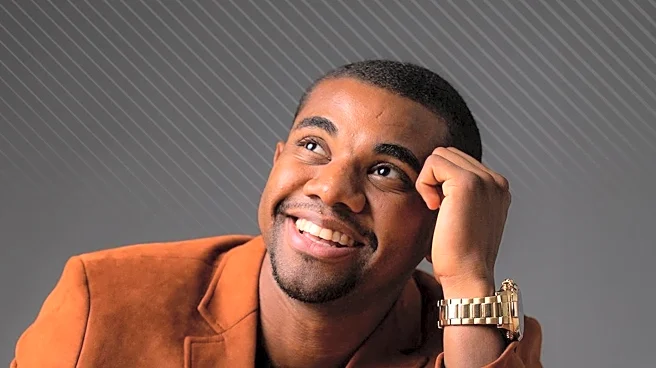What's Happening?
Entrepreneur Bryan Johnson has shared his elaborate 17-step morning routine aimed at promoting longevity and health. Starting at 4:30 am, Johnson's regimen includes various unconventional practices such as red light therapy, sauna sessions with ice packs, and hyperbaric oxygen therapy. He also incorporates dietary elements like protein, collagen, and olive oil, alongside supplements designed to enhance muscle and cognitive performance. Johnson's routine is detailed in a recent YouTube video, where he explains the rationale behind each step, citing scientific studies and personal experiences. While some practices, like exercise and time-restricted eating, are supported by scientific evidence, others, such as whole-body red light therapy and shockwave therapy, remain experimental with limited human data. Johnson's approach reflects a growing trend in personalized health and wellness strategies, though it raises questions about the efficacy and necessity of such extreme measures.
Why It's Important?
The significance of Bryan Johnson's morning routine lies in its reflection of a broader trend towards personalized health and longevity practices. As individuals increasingly seek ways to extend their lifespan and improve health, Johnson's routine exemplifies the lengths to which some are willing to go. This trend has implications for the wellness industry, potentially driving demand for advanced health technologies and supplements. However, it also highlights the need for critical evaluation of such practices, as many lack robust scientific backing. The routine's emphasis on costly and experimental therapies may not be accessible or advisable for the general public, raising ethical considerations about the commercialization of health and longevity. As more people explore these avenues, the wellness industry may face pressure to provide evidence-based solutions that are both effective and accessible.
What's Next?
The future of personalized health routines like Bryan Johnson's may involve increased scrutiny and demand for scientific validation. As interest in longevity practices grows, researchers and health professionals may focus on studying the efficacy of these methods, potentially leading to new guidelines and recommendations. The wellness industry could see a shift towards more evidence-based offerings, balancing innovation with proven health benefits. Additionally, public discourse may evolve to address the ethical implications of promoting expensive and experimental health practices, encouraging a more inclusive approach to wellness. Stakeholders, including health experts and policymakers, may play a role in shaping the narrative around longevity, advocating for practices that are both scientifically sound and accessible to a wider audience.
Beyond the Headlines
Beyond the immediate implications of Bryan Johnson's routine, there are deeper cultural and ethical dimensions to consider. The pursuit of longevity reflects societal values around health, aging, and the desire for control over one's lifespan. This trend may influence cultural attitudes towards aging, potentially stigmatizing natural aging processes and promoting a youth-centric ideal. Ethical questions arise regarding the accessibility and fairness of such practices, as they may cater primarily to those with significant financial resources. The focus on extreme health measures could also impact mental health, as individuals strive for unattainable standards of wellness. As the conversation around longevity evolves, it may prompt a reevaluation of societal priorities, emphasizing holistic health and well-being over mere lifespan extension.










